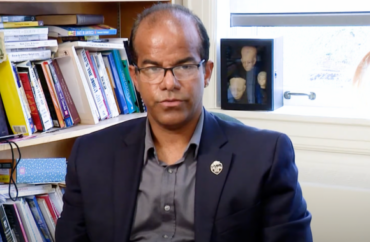
OSU faculty say Trump’s policies could threaten black communities through tougher policing, cuts to Pell Grants, attacks on DEI
Three Oregon State University faculty members said many of President-elect Donald Trump’s policies will harm black Americans and that Kamala Harris lost votes in the election because she’s a woman at a recent panel discussion.
Christopher Stout, an associate professor of political science at OSU, said that while voters were unlikely to admit in surveys that Harris’s gender played a role in their decision, women’s perceived lack of decisiveness contributed to her loss.
“Women are seen as being less decisive than their male counterparts,” Stout said during the Jan. 9 event titled “Panel Discussion on the Implications of Donald Trump’s 2024 Election for African Americans in the United States.”
He also said the race’s focus on the economy hurt Harris because women are “perceived as being weaker on economic issues.”
Stout said this stereotype stems from the frequency of male politicians discussing economic issues on television. Economic concerns also played a significant role in minority men shifting their support toward Trump in 2024 compared to 2020, he said.
This discussion about the factors influencing Harris’s loss transitioned into a broader analysis of the potential implications of Trump’s 2024 election victory.
Tenisha Tevis, an associate professor of education at OSU, said Trump’s desire to reform or eliminate the Department of Education would jeopardize important provisions such as Title IX and Title VI, which prohibit discrimination on the basis of sex and race, respectively. She said eliminating the department would increase disparities across the nation by leaving the role of education to the states.
MORE: OSU gets $1 million to train ‘diverse’ agricultural workforce
Tevis also said Trump may push for more restrictive student loan rules and potential cuts to Pell Grants, a type of federal financial aid. Citing the fact that almost 60 percent of black students are eligible for Pell Grants, Tevis called cuts to the system a “direct hit to black communities.”
The professor transitioned to the topic of diversity, equity, and inclusion, condemning “anti-DEI” policies as a “threat to free speech.” Tevis said Republicans’ efforts to disallow DEI initiatives infringe on the right of students and faculty to say what they want without fear of censorship.
Any movement that doesn’t allow you to name who you are is a “threat to humanity” and allows those who oppose DEI programs to get to decide “who gets to be human and who is not human,” the professor said.
She also said some anti-DEI initiatives are causing fear among faculty, leading some of her peers to record their lectures so that no one can misrepresent their words.
Tevis also claimed that state laws against racial indoctrination in classrooms prohibit talking about Martin Luther King, Jr. and Susan B. Anthony.
Shifting to criminal justice, Dwaine Plaza, a professor of sociology at OSU, said “it looks like it’s going to be a very vengeful next four years” with former Attorney General of Florida Pam Bondi nominated to lead the U.S. Department of Justice.
Plaza (pictured) said that because black Americans are more likely to be imprisoned than other racial groups, a return to tough-on-crime policies under Trump would be particularly harmful to them.
He also said crime has been decreasing over the last several years and described claims of rising crime rates as a “ploy” used by Republicans.
Further, police often “look like an occupying force in neighborhoods,” and their presence can be “traumatic” to black Americans, the professor said.
Stout, Tevis, and Plaza did not respond to The College Fix’s requests for comment via email in the last week regarding the challenges facing African Americans in a new political climate and what action or understanding they hoped would result from the panel.
MORE: Arizona State U. scholars condemn ‘white ownership’ of Shakespeare
IMAGE: Institutional Diversity at Oregon State University/Youtube
Like The College Fix on Facebook / Follow us on Twitter






Please join the conversation about our stories on Facebook, Twitter, Instagram, Reddit, MeWe, Rumble, Gab, Minds and Gettr.